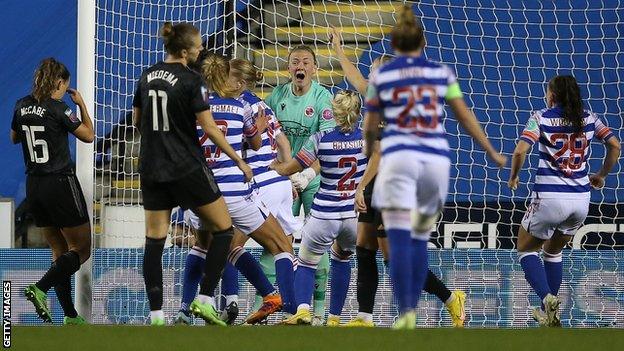Marissa Callaghan: Women's football should move to weekend, says Northern Ireland captain
- Published
'Investment in players will help NI in long run ' - Callaghan
Northern Ireland captain Marissa Callaghan says changing Women's Premiership fixtures from a Wednesday to the weekend will improve women's football "massively".
Matches in the league are currently held midweek.
In comparison, the majority of men's Irish Premiership games take place on a Friday night or Saturday afternoon.
"When you are working full-time and have a young son to look after, it is quite tough," said Callaghan.
She added: "In my opinion, the game needs to change from a Wednesday evening to weekend fixtures.
"I think it would be more beneficial for the teams and players to make sure they have a proper training week."
Callaghan, who captained Northern Ireland to the Euro 2022 finals in July, added having games at the weekend would boost attendances and help the game grow.
The majority of Women's Super League matches in England take place on a Sunday afternoon.
"Most of the fans who come to our Northern Ireland games are young girls and boys," she added.
"You can't expect them to come out on a Wednesday night at 8pm to come and watch a game, especially if they have school the next day.
"I think overall, for a lot of aspects of the game, we need to have games at the weekend and it will create a huge fan base.
"It will get numbers through the gates and, ultimately, it will improve it massively."

Marissa Callaghan plays for Women's Premiership leaders Cliftonville
The Northern Ireland Football League, which runs the Women's Premiership, says it works with all clubs and Wednesday night "has unanimously been the preferred choice of clubs."
A spokesperson added: "We recommend that any players concerns should be directed to their club representatives to be raised ahead of next season.
"The NI Football League will always be progressive and open to change, as clubs currently have the option to freely change scheduled match dates with agreement of their opponents within the current Women's Premiership rules but to date there have been no proposals from any member clubs to change from the current agreed days."
Continuing with full-time programme 'impossible'
Twenty-two domestic-based players were brought into a seven-month full-time programme before the Euro 2022 finals, however that ended following Northern Ireland's exit from the tournament.
Four months have passed since, and Irish FA chief executive Patrick Nelson said it is "impossible to continue with a full-time programme".
"We are never going to say no to any support that we get," he added.
"That was very much focused on preparation for the Euros, but we are keen to have a good legacy in terms of trying to generate a pathway for young girls to get into professional football."
While the professional programme has ended, goalkeeper Jackie Burns and winger Lauren Wade have moved to Women's Super League side Reading while defender Demi Vance moved to Leicester City.
Nelson added that he is working with Angela Platt, director of women's football at the IFA, to establish a pathway that will provide a platform for players going forward.
"The idea is it will be different from the boy's pathway into football, but a pathway we will generate," he said.
"The structures are different in terms of girls football, both locally and over in England compared to boys football.
"What we will generate is a pathway that matches the rest of the game from a girls and women's perspective.
"It won't be exactly the same as the boys one, but it will be one that generates a real way into professional careers for our girls when they want to play football."

Jackie Burns saved a penalty on her Women's Super League debut for Reading on Sunday
Callaghan added her belief that Northern Ireland's experience at the Euros should be the "beginning of something" for the women's game on home shores.
Currently, the Women's Premiership is an amateur league, however there are plans for professionalism to be introduced from the 2023 season and the league will expand to 10 teams.
Glentoran had planned to become a professional side ahead of the current season, however plans were put on hold by the Northern Ireland Football League to create a balanced playing field and give all teams time to adjust from their amateur status.
Callaghan said introducing money into the local game was a positive step but that "we need to get it right".
"We need to get a pathway to make sure we can develop the individual and, ultimately, develop the squad," she added.
"We need to have a plan and hopefully we won't just jump into it and hand out money here, there and everywhere.
"I think we need a sustainable plan for all the clubs so it is an equal playing field. What that looks like I don't know, but in an ideal world if we can sit down as a league and association and look at a five or 10-year plan.
"We have some outstanding young players coming through and it is about trying to develop them to be world class players".